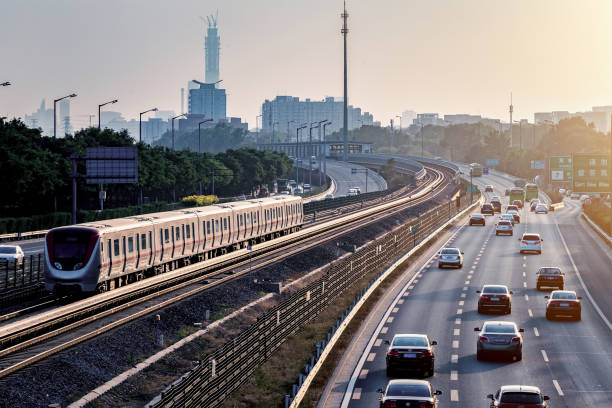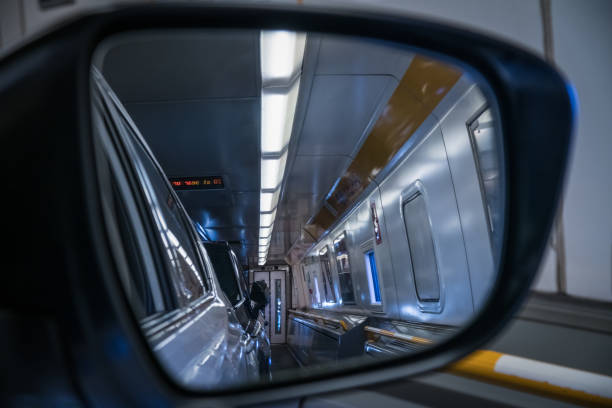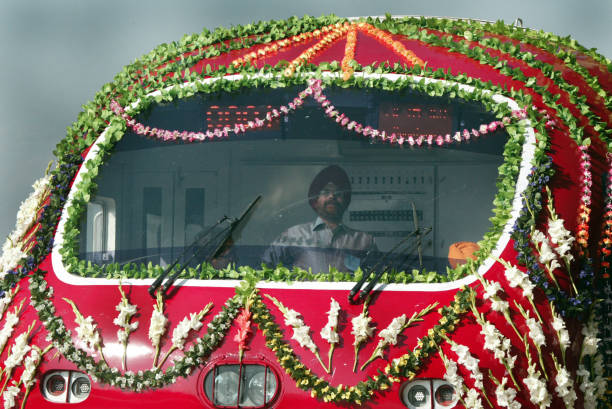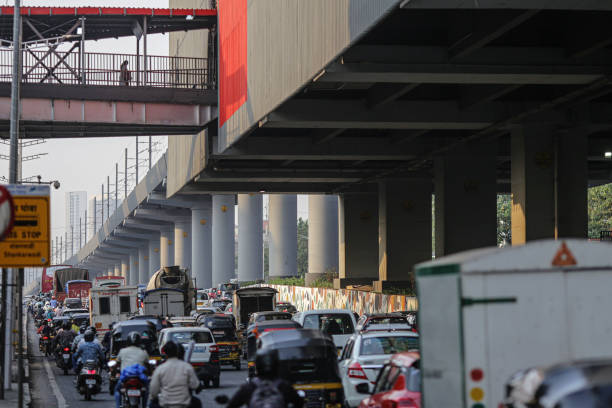As India continues to evolve as a bustling economic powerhouse, the demand for efficient and reliable car transport by train solutions has never been higher. Among the various options available for vehicle relocation, transporting cars by train stands out as a cost-effective, safe, and environmentally friendly choice.
This comprehensive guide will explore the advantages, processes, costs, and safety considerations involved in the car transport by train in India, providing you with all the information you need to make an informed decision.
Let’s learn how to transport car by train quickly.
Benefits of Car Transport by Train
Transporting your car by train in India offers several advantages, including:
- Cost-Effectiveness: Car transport by train is often more affordable than road transport, particularly for long distances. Railways offer bulk transport options, reducing the per-vehicle cost.
- Safety: Trains provide a secure environment for car transport, minimizing the risks associated with long-distance driving such as accidents and breakdowns.
- Environmental Impact: Rail transport is more fuel-efficient and generates fewer emissions compared to road transport, making it a greener option.
- Convenience: Car transport by train can save time and reduce the stress associated with driving long distances.
How to transport car by train
Also Read: State-Wise EV Subsidies in India
Documents and Procedures Various documents are required for car transport via train in India:

- Transportation Form: It is filled up at the Parcel Office and contains details of the transportation contract.
- Vehicle Registration Certificate (RC): As proof of vehicle ownership.
- Insurance Certificate: Ensures that your vehicle is insured against damage during transportation.
- Emissions Certificate: This is proof that your vehicle meets environmental standards.
- Identity Proof: Copy of Aadhar Card, PAN Card, or any other government ID.
1. Booking the Service
To book car transport by train, you need to follow these steps:
- Research: Start by researching the available options. Indian Railways offers car transport services, and there are also several private logistics companies that facilitate car transport via train.
- Choose a Service Provider: Based on your research, select a service provider that meets your requirements in terms of cost, reliability, and service quality.
- Documentation: Prepare the necessary documents, including the car’s registration certificate, insurance papers, and a photo ID proof. Some service providers might require additional documents, so check with them in advance.
- Booking: Visit the nearest railway station with parcel service or contact the service provider online to book your slot. Fill out the required forms and submit the documents. Pay the booking fee to confirm your reservation.
2. Preparing Your Car for Transport
Once your booking is confirmed, it’s important to prepare your car for transport:
- Clean Your Car Thoroughly clean your car, both inside and out. This will make it easier to inspect for any pre-existing damage.
- Remove Personal Items: Remove all personal belongings and valuables from the car. The transport service is not responsible for items left inside the vehicle.
- Check for Leaks: Ensure there are no fluid leaks. If there are, get them fixed before transport.
- Fuel Level: Leave only a small amount of fuel in the tank – just enough for loading and unloading. This reduces the car’s weight and potential hazards.
- Document Condition: Take photos of your car from different angles to document its condition before transport. This will be useful in case of any damage claims.
3. Loading and Transport

On the day of transport:
- Arrive Early: Arrive at the loading point early to complete any last-minute paperwork and ensure your car is securely loaded onto the train.
- Inspect Loading: Watch the loading process to ensure your car is handled with care. Trains usually use flatbed carriages or specially designed car carrier wagons for vehicle transport.
- Tracking: Once your car is loaded, you will receive a tracking number. Use this to monitor the progress of your shipment.
4. Documentation
For those considering this option, it is important to understand the cost implications of transporting a car by rail in India. Costs can vary significantly depending on a variety of factors, including origin and destination cities, type of vehicle, and additional services such as insurance.
Here we provide a comparative cost analysis of various major cities, addressing factors that affect the cost and providing some example scenarios with estimated prices.
5. Unloading and Delivery
Upon reaching the destination:
- Inspection: Inspect your car carefully upon unloading. Check for any new damage and compare it with the pre-transport photos.
- Report Issues: If there is any damage, report it immediately to the service provider and file a claim if necessary.
- Collect Your Car: After inspection, complete any remaining paperwork and drive your car away from the station.
Costs Involved
The cost of transporting a car by train in India depends on several factors:
- Distance: Longer distances typically cost more.
- Type of Service: Indian Railways offers two types of services – Parcel and Freight. Parcel services are generally cheaper but might take longer.
- Car Size: Larger vehicles occupy more space and hence cost more to transport.
- Additional Services: Insurance, door-to-door service, and express delivery options can add to the overall cost.
On average, transporting a car by train in India can cost anywhere between ₹5,000 to ₹20,000, depending on the above factors.
Related: How Turbo Work in 2024: A Complete Guide
Safety Considerations
To ensure the safe transport of your car:
- Choose a Reputable Service Provider: Opt for well-known and reliable service providers with positive reviews and a proven track record.
- Insurance: Ensure your car is adequately insured during transport. Many service providers offer transport insurance, but you can also opt for additional coverage if needed.
- Secure Loading: Supervise the loading process to ensure your car is properly secured on the train carriage.
- Regular Updates: Stay in touch with the service provider for regular updates on your car’s location and status.
- Seasonal Variations: During peak seasons, prices may increase due to increased demand.
Comparative Cost Analysis of Car Shipping from Major Cities

The cost of car transport via train shipment in India varies depending on the origin and destination cities. Here is an overview of some major cities:
- Mumbai to Kolkata: For a comparable car, the cost could be INR 7,000 to INR 12,000.
- Kolkata to Chennai: Expect to pay INR 8,000 to INR 13,000.
- Chennai to Bangalore: Since the distance is shorter, the fare could be INR 4,000 to INR 7,000.
- Bangalore to Delhi: For this longer-distance route, the cost could be INR 10,000 to INR 15,000.
Car Transport via Train: Example Scenarios with Estimated Costs
Here are some what-if scenarios to give you a better idea:
Scenario 1: SUV (Mumbai to Kolkata)
- Model: SUV (ex: Toyota Fortuner)
- Distance: Approx. 2,000 km Estimated
- Cost: 4 444. 9,000 – 14,000 INR
Scenario 2: Bangalore to Delhi
- Model: Luxury Sedan (ex: BMW 5 Series)
- Distance: Approx. 2,150 km
- Estimated Cost: INR 12,000 – INR 18,000
Pros and Cons of Car Transport by Train
For many in India, car transport via train is a viable option, but like any other mode of transportation, there are pros and cons. Understanding these will help you make an informed decision about whether this method meets your needs. Here we look at the advantages and disadvantages of shipping a car by rail.
Car transport by train: Advantages
- Cost-effectiveness: Compared to other modes of transport, for example autonomous driving or road transport services, it is often more economical to transport cars by train, especially over long distances.
- Safety and Security: trains provide a safe environment for transporting vehicles. There is generally a lower risk of accidents and theft than road transport. Vehicles are secure and monitored throughout the journey.
- Environmental Benefits: Rail transport is more environmentally friendly than road transport. Trains produce significantly less carbon dioxide emissions per ton-mile, making them a greener option for those concerned about their carbon footprint.
- Accessibility and Network Coverage: India’s extensive rail network ensures access to even remote areas. This long-range makes it a convenient option to transport vehicles to different parts of the country.
Car transport via train: Drawbacks
- Cons Time Considerations: Transporting a car by train can take time. This process includes travel time as well as booking, loading, and unloading time. It usually takes longer than direct road transport.
- Limited flexibility and control: Once the vehicles are loaded onto the train, you have little control over the transport process. Unlike driving yourself or hiring a driver, you can’t stop along the way or change the route.
- Potential for delays and damage: While generally safe, there is always a risk of delays due to logistical problems or damage during loading and unloading. Such incidents are rare, but they can be inconvenient and costly.
- Restrictions and limitations: There are limits to the size and type of vehicles that can be transported by rail. Larger vehicles or vehicles with special requirements may not be accepted. Also, certain routes are not available for all vehicle types.
Preparing your vehicle car transport via train

Preparing for car transport by train must be properly prepared for rail transport so that the transportation is smooth and hassle-free. Proper preparation not only protects your vehicle but also helps in complying with the regulations of the railway authorities. Here are some important steps and tips to prepare your car transport by train in India:
1. Mechanical inspection
Make sure the car is in good condition. Check the brakes, battery and tyres. Any mechanical problems should be addressed in advance to avoid complications when loading and unloading.
2. Clean your car
Keeping your car clean will make it easier to identify any damage that may occur during transport. Wash the car both outside and inside.
3. Document any existing damage
Take detailed photos or videos of the car from different angles. Notice any scratches, dents, breakage etc. This documentation is important if you need to submit a claim for shipping damage.
4. Tank contents
Reduce the tank contents by approximately one-quarter. This will minimize weight and reduce the risk of leakage during transport. Disable the alarm system: Always disable your car’s alarm system to avoid unnecessary triggering while driving.
5. Check fluids
Ensure all fluids (oil, coolant etc.) are at the correct level and there are no leaks.
Car transport by train: Insurance and safety measures
- Transport insurance: Choose transport insurance that covers possible damage during transport. Basic insurance is provided for rail services but additional coverage is beneficial for complete peace of mind.
- Check your insurance policy: Understand the terms of your insurance policy. Find out what is and isn’t covered and how to file a claim if necessary.
Car transport by train: Tips to protect your personal belongings
- Secure loose parts: If your car has any loose parts or accessories (antennas, spoilers, side mirrors, etc.), secure them properly or remove them if possible.
- Lock the vehicle: Ensure that the vehicle is locked after loading onto the train. This will prevent any unauthorized access during transport.
- Keep a spare key: Always carry a spare key. Never leave the only key inside the car.
- Documentation: Keep copies of all relevant documentation including registration, insurance and transport documents in a safe place.
Car transport by train: Legal Aspects of Transportation of Motor Vehicles by Railways in India
Knowledge of the legal and regulatory framework is an important aspect when transporting motor vehicles by railways in India. Understanding these requirements will help you comply with the law and ensure a smooth transportation process. In this section, we will discuss the key legal aspects of car transport by train and the documents required.

1. Understanding the legal framework Railway Regulations:
Indian Railways, which comes under the Ministry of Railways, has special regulations for the transportation of motor vehicles. These regulations cover aspects such as the types of vehicles permitted, packaging standards, liability in case of damage, insurance requirements, etc.
2. Liability and Insurance Act:
The Indian Railways Act and its regulations govern the liability of the Railways if goods (including vehicles) are lost or damaged during transportation. It is important to understand the extent of the Railways’ liability and the need for additional insurance.
3. Environmental Compliance:
Transported vehicles must comply with the Central Pollution Control Board’s emission standards. Ensure that your vehicle has a valid Pollution under Control (PUC) certificate.
4. Interstate Regulations:
If you are transporting on interstate highways, be aware that special regulations may apply, such as Import duties or permits for certain vehicle types.
Car Transport by Train: Required Documents and Compliance
- Vehicle Registration Certificate (RC): This is the most important document that proves the ownership of the vehicle. Make sure it is valid and up to date.
- Insurance Certificate: Your vehicle must have a valid insurance policy. This is important not only for legal reasons but also to be able to claim compensation in case of damage during transportation.
- Emission Certificate: A valid PUC certificate is mandatory to abide by environmental regulations.
- Identity Proof: Government-issued ID card (Aadhar, PAN, passport etc.) is required for verification.
- Transport Form: This form is provided by the Railway Parcel Office and contains the terms and conditions of transport service. It should be filled up accurately and submitted along with other documents.
- No Objection Certificate (NOC): In certain cases, especially if the vehicle is taken on loan or mortgage, an NOC from the financier may be required.
- Booking Card/Railway Receipt (RR): This is issued by the Railway Parcel Office at the time of booking and is an important document to track and retrieve the vehicle at the destination.
(Tip: Instead of opting for car transport by train, you can also hire a professional car transport service for safe and hassle-free transportation.)
Car Transport by Train: Conclusion
Transporting your car by train in India is a practical, economical, and environmentally friendly option, especially for long distances. By following the steps outlined in this guide, you can ensure a smooth and hassle-free transport experience. Whether you are relocating to a new city or simply need to transport your car, understanding the benefits, processes, and costs involved will help you make an informed decision.
As the infrastructure and services around car transport by train continue to improve, this mode of transport is set to become even more popular. Embrace this efficient and reliable method to ensure your car reaches its destination safely and efficiently.
By understanding the comprehensive process and taking the necessary precautions, you can make your car transport experience by train in India both smooth and successful. Happy travels!
Read Also:

